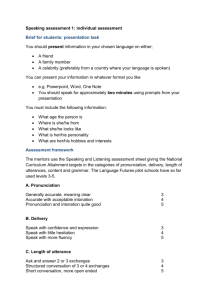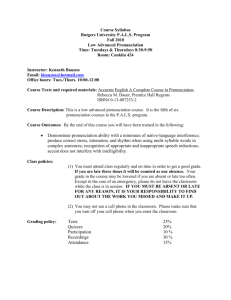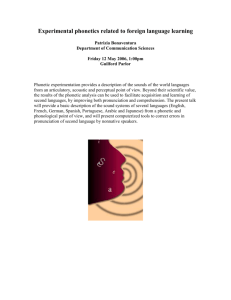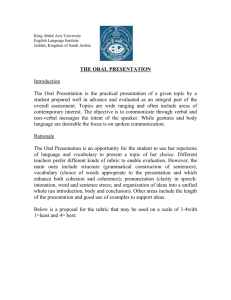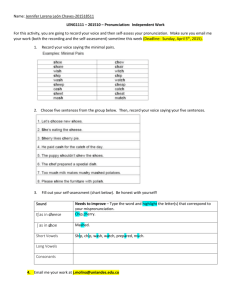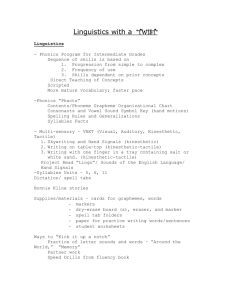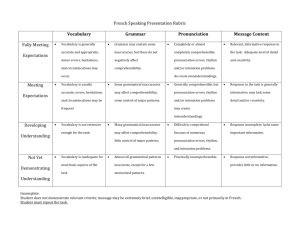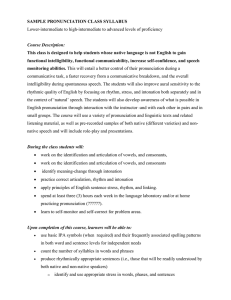CALL ‘EM AS YOU HEAR ‘EM: Ear Training & Phonetic Transcription
advertisement
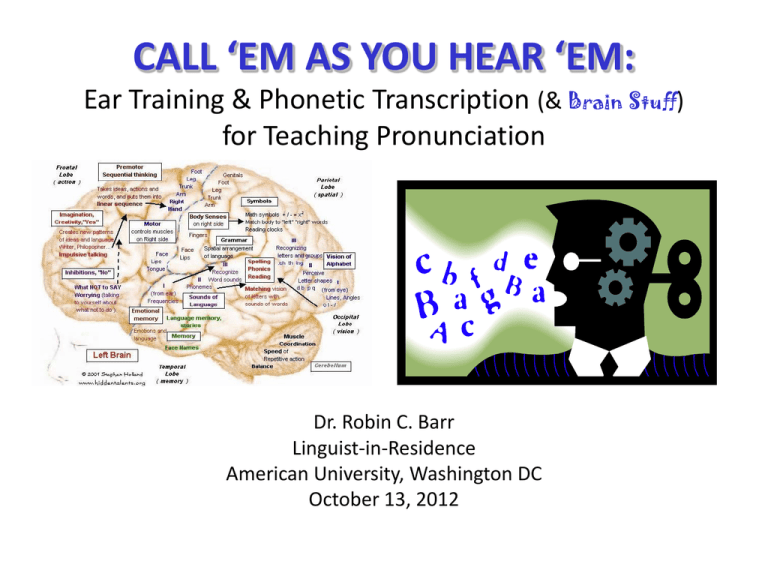
CALL ‘EM AS YOU HEAR ‘EM: Ear Training & Phonetic Transcription (& Brain Stuff) for Teaching Pronunciation Dr. Robin C. Barr Linguist-in-Residence American University, Washington DC October 13, 2012 Myths about Teaching Pronunciation • Only native speakers can teach it. • Teachers must speak ‘clearly’ and not like normal conversation. • Pronunciation is about consonants and vowels. How the brain processes language: Left hemisphere Broca’s Area: automatic rules of phonology and syntax Wernicke’s Area: lexical access How the brain processes language: Right hemisphere Rhythm Intonation How to bypass Broca’s Area? How to bypass Broca’s Area? Left hemisphere Right hemisphere • L1 Phonetics and Phonology rules • L1 Morphology and Syntax rules • Fast speech: Consonants and short vowels • Math, Logic, Analysis • Sequencing • Routines • • • • • • • • Music Emotions Intonation and long vowels Environmental sounds Non-L1 sounds Gestalt processing Faces and Spatial processing Exceptions, details How to bypass Broca’s Area? Use other parts of the brain and other learning styles. • Visual • Kinesthetic / muscle memory • Musical / non-linguistic sounds • No more “listen harder!” So, what is ‘ear training’? Raising awareness of speech sounds by using other parts of the brain and other learning styles. • Visual • Kinesthetic / muscle memory • Musical / non-linguistic sounds • No more “listen harder!” • Production leads to perception DANGER! Don’t rely too much on the written language: • • • • Pronunciation is not “reading aloud” English spelling is not phonetic Students need to understand spoken language You will hear what you expect to hear [Elf] http://www.youtube.com/watch?v=A_B5UrI7nAI [Masking] http://youtu.be/Wte8wQbvZ1I [McGurk Effect] http://www.youtube.com/watch?feature=endscreen&NR=1&v=Dj-22YRuigY Phonetic transcription – you already know more than you think you do. CONSONANTS PLACES OF ARTICULATION LABIAL MANNERS OF ARTICULATION Stops voiceless voiced Affricates bilabial DENTAL labiodental interdental p b alveolar t d voiceless voiced Fricatives f v voiceless voiced Nasals m Liquids Glides w θ ð s z n l palatal č ǰ š ž r y velar k g uvular glottal ʔ h ŋ Phonetic transcription – you already know more than you think you do. VOWELS Front Central Back tense i ɨ u lax I tense e lax ɛ High Mid Low æ ʊ ə o ɔ ʌ ɑ Locate vowels with lollipops and colors – don’t trust your ears! Rubber bands: stress and vowel length (Visual/kinesthetic/rhythmic) Rubber bands: stress and vowel length (Visual/kinesthetic/rhythmic) DA da da da DA da da da DA Michigan Maryland Iowa (etc.) Nevada New Hampshire Hawaii (etc.) Illinois Tennessee Kazoos for intonation and rhythm: How to kazoo? Hum into the big end -- don’t blow! Kazoos for intonation and rhythm: • Baby babbling, part 1 • http://youtu.be/lih0Z2IbIUQ • Baby babbling, part 2 • http://youtu.be/_JmA2ClUvUY • Gabby Giffords Rehab • http://abcnews.go.com/Nightline/video/giffords-rebuildsspeech-song-14953328 Kazoos for intonation and rhythm Key word/ phrase Stress pattern Key word/ phrase GREAT way to GO PERfect FAScinating the BEST inCREdible WONderful overWHELMing aMAzing out of this WORLD Stress pattern Adapted from Karen Taylor Simple Songs with rhythm that matches the spoken language: Clap Clap Clap THREE BLIND MICE THREE BLIND MICE SEE HOW they RUN SEE HOW they RUN They ALL ran AF ter the FAR mer’s WIFE She CUT off their TAILS with a CAR ving KNIFE Did you E ver SEE SIGHT in your LIFE As THREE BLIND such a MICE! Clap Chants: Step Left Jump-rope rhymes, cheers, marching cadences. Step Right LEFT LEFT I LEFT my Step Left LEFT right LEFT wife and FORty-three children A- LONE in the house with- OUT any LEFT LEFT Step Right LEFT right LEFT peanut-butter Lexical chunks: chant useful phrases, teach syntax and morphology, without using Broca’s Area. (adapted from Carolyn Graham, Jazz Chants) I’m SORry I WAS n’t in CLASS! I’m SORry I WAS n’t in CLASS! I had the FLU! I’m SORry I My CAR broke My CAT got WAS n’t in DOWN! SAID, ] SICK! CLASS! I LOST my I ______ my _______ ! My ______ is [I _______ ! (etc.) KEYS! Understanding how the brain conceals linguistic information can help you increase • your students’ Accuracy • your students’ Comprehensibility • your students’ Fluency Challenges: convincing • students • teachers • administrators
